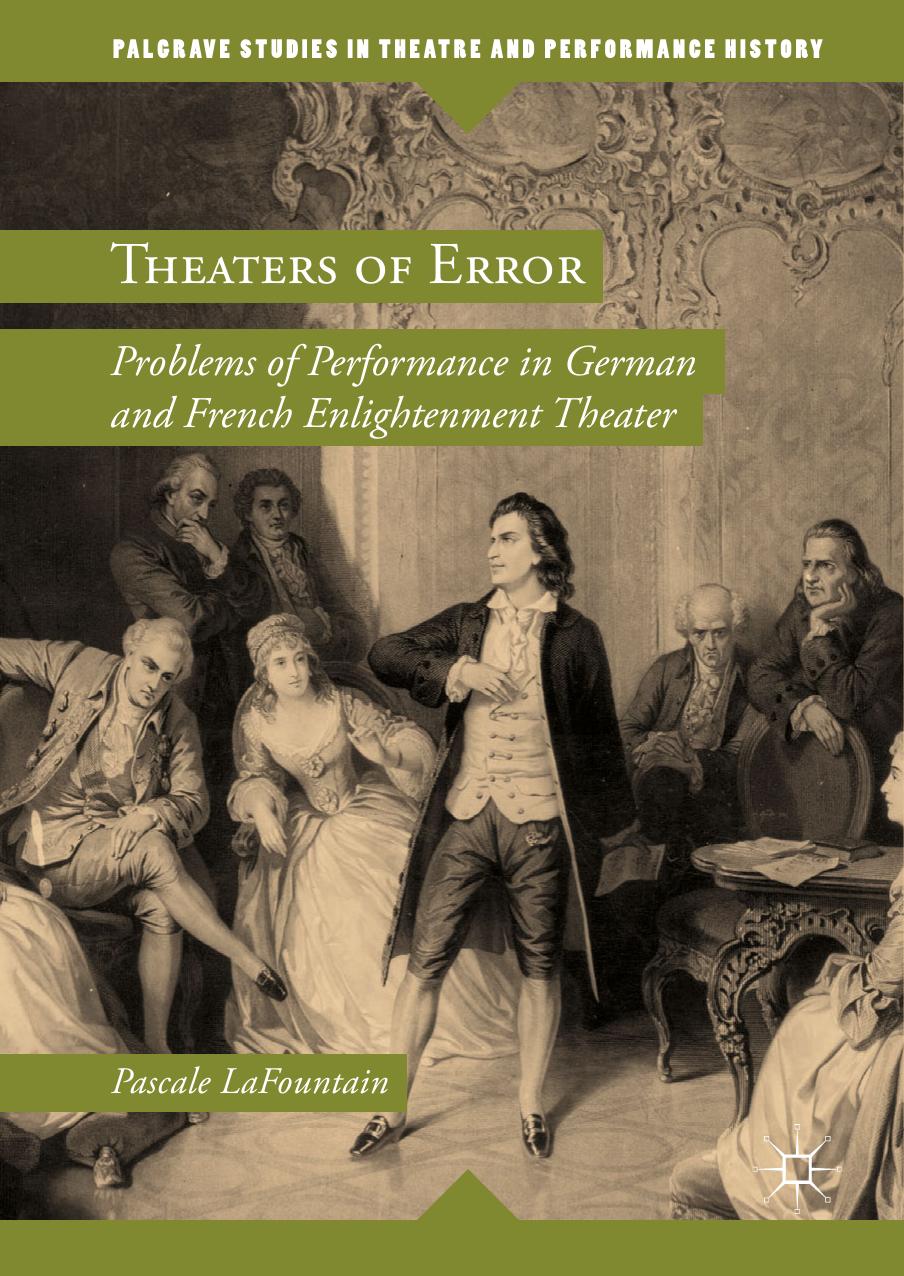Theaters of Error by Pascale LaFountain

Author:Pascale LaFountain
Language: eng
Format: epub, pdf
Publisher: Springer International Publishing, Cham
5 Affect and Diderot’s Revolutionary Society of Error
The drama’s final scenes again bring the minisociety of the family and its domestic servants together, as is typical in traditional drama and as had already taken place at the end of the third act. Dorval challenges Rosalie to make the choice that will make her “digne de la société dans laquelle vous vivez” (deserving of the society in which you live) (96), both demonstrating the view that the individual has agency over personal behavior and reminding Rosalie of the importance of society. The term “méchant” (mean person) here, as in the attack on Clairville by the “méchants” who insulted Dorval in Clairville’s presence, always describes people who have lost their social direction. To be mean in this sense will lead one into solitude, whereas the model of error commission, acknowledgment, and recovery is typical of members of a society. While an error such as Constance’s misinterpretation of the letter can be corrected through analysis, to act against one’s own best conscience is, to use Dorval’s imagery, to cut the string leading through the labyrinth, breaking oneself off from society and condemning oneself to wander (“s’égarer”) in eternal solitude without social connection. To ignore the judgments of others is to isolate oneself, whereas to share one’s pain with others is to partake in the deepest social bond. Lessing’s Laokoon had explored the challenges of representing pain in sculpture, and the inexpressibility of pain continues to fascinated theorists such as Elaine Scarry , whose The Body in Pain takes the difficulty of communicating pain as its starting point. In Le Fils naturel , the phrase “partager votre peine” (share your pain) appears several times, as Clairville’s friendship with Dorval begins as a willingness to share happiness and pain, and as Constance encourages Rosalie to share her pain (81). Empathy is, for Diderot, not just an attempt to understand another person but, rather, the experience of sharing another’s physical pain, which here often results in the listener’s own physical reaction of empathy.
Judgment by others also takes place through physical perception and silent physical communication. When Dorval talks to Rosalie about the implications of their staying together, he mentions not so much what others will say when they commit “le mal” (evil), but the pain that the “regards” (looks) inflict on the evildoer (97). One can try to avoid the “regard sévère” (severe gaze) (97) of Constance and Clairville, but the torment of shame and remorse, described with the image of walking with “la tête baissée” (the head lowered) (97), will be inescapable. Even in hearing about the shame they will experience, Dorval notes Rosalie’s physical reactions, “Vous rougissez. Vous baissez les yeux…” (You blush. You lower your eyes …) (98). Just as Rosalie’s body reflects her sensitivity, Dorval’s ability to read her body is evidence of their communication. Moreover, the particular focus on shame as an affect suggests the importance of error recognition in the development of the individual. As Eve Kosofsky Sedgwick argues, shame
Download
This site does not store any files on its server. We only index and link to content provided by other sites. Please contact the content providers to delete copyright contents if any and email us, we'll remove relevant links or contents immediately.
| Ancient & Classical | Arthurian Romance |
| Beat Generation | Feminist |
| Gothic & Romantic | LGBT |
| Medieval | Modern |
| Modernism | Postmodernism |
| Renaissance | Shakespeare |
| Surrealism | Victorian |
4 3 2 1: A Novel by Paul Auster(12396)
The handmaid's tale by Margaret Atwood(7770)
Giovanni's Room by James Baldwin(7350)
Big Magic: Creative Living Beyond Fear by Elizabeth Gilbert(5778)
Asking the Right Questions: A Guide to Critical Thinking by M. Neil Browne & Stuart M. Keeley(5778)
Ego Is the Enemy by Ryan Holiday(5453)
The Body: A Guide for Occupants by Bill Bryson(5100)
On Writing A Memoir of the Craft by Stephen King(4947)
Ken Follett - World without end by Ken Follett(4737)
Adulting by Kelly Williams Brown(4579)
Bluets by Maggie Nelson(4561)
Eat That Frog! by Brian Tracy(4543)
Guilty Pleasures by Laurell K Hamilton(4451)
The Poetry of Pablo Neruda by Pablo Neruda(4112)
Alive: The Story of the Andes Survivors by Piers Paul Read(4035)
White Noise - A Novel by Don DeLillo(4014)
Fingerprints of the Gods by Graham Hancock(4006)
The Book of Joy by Dalai Lama(3989)
The Bookshop by Penelope Fitzgerald(3855)
